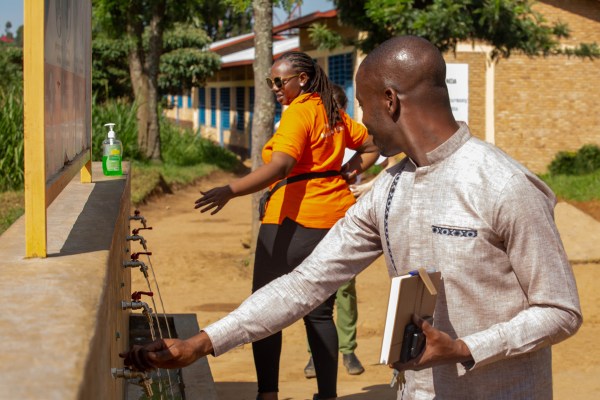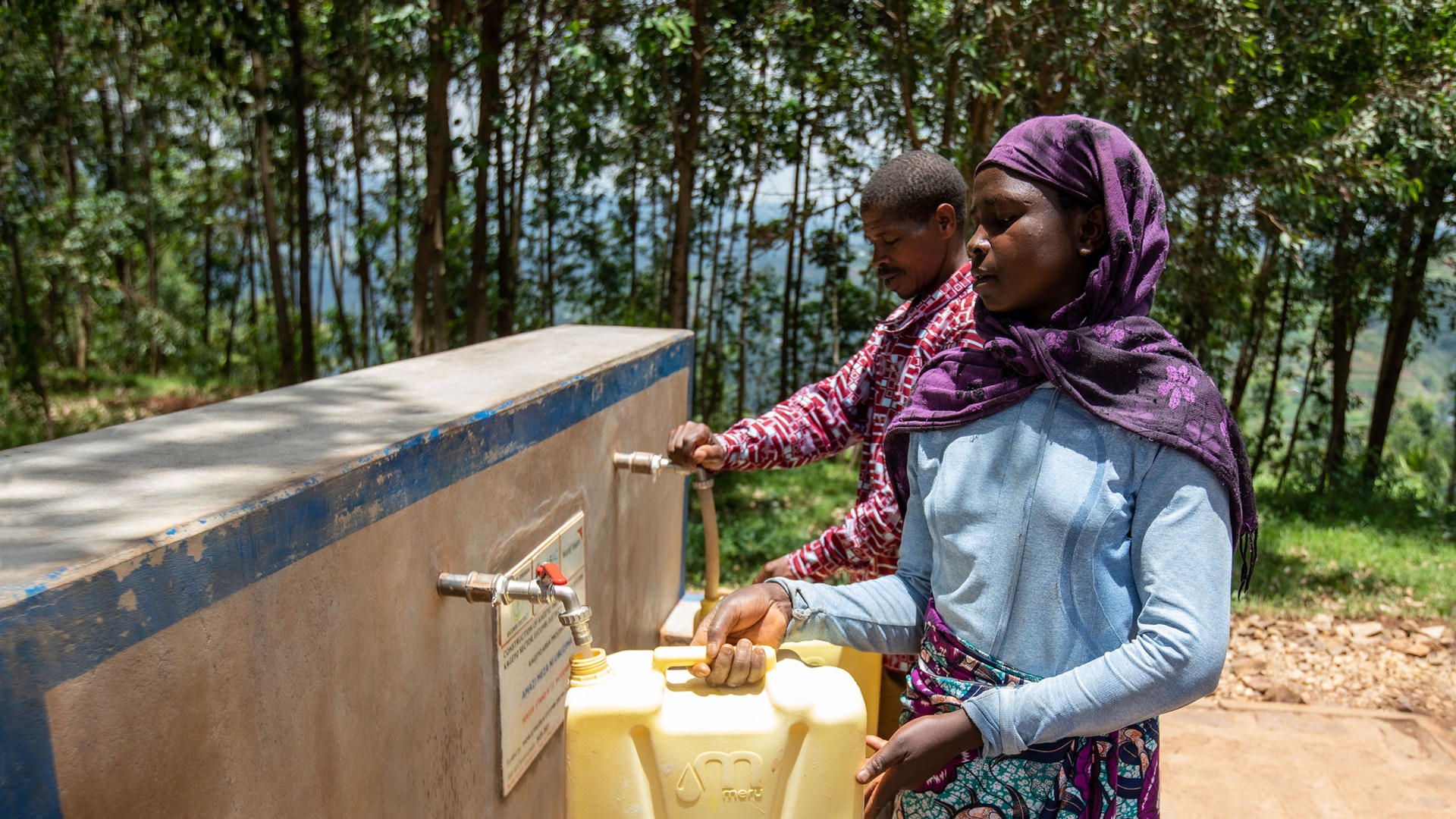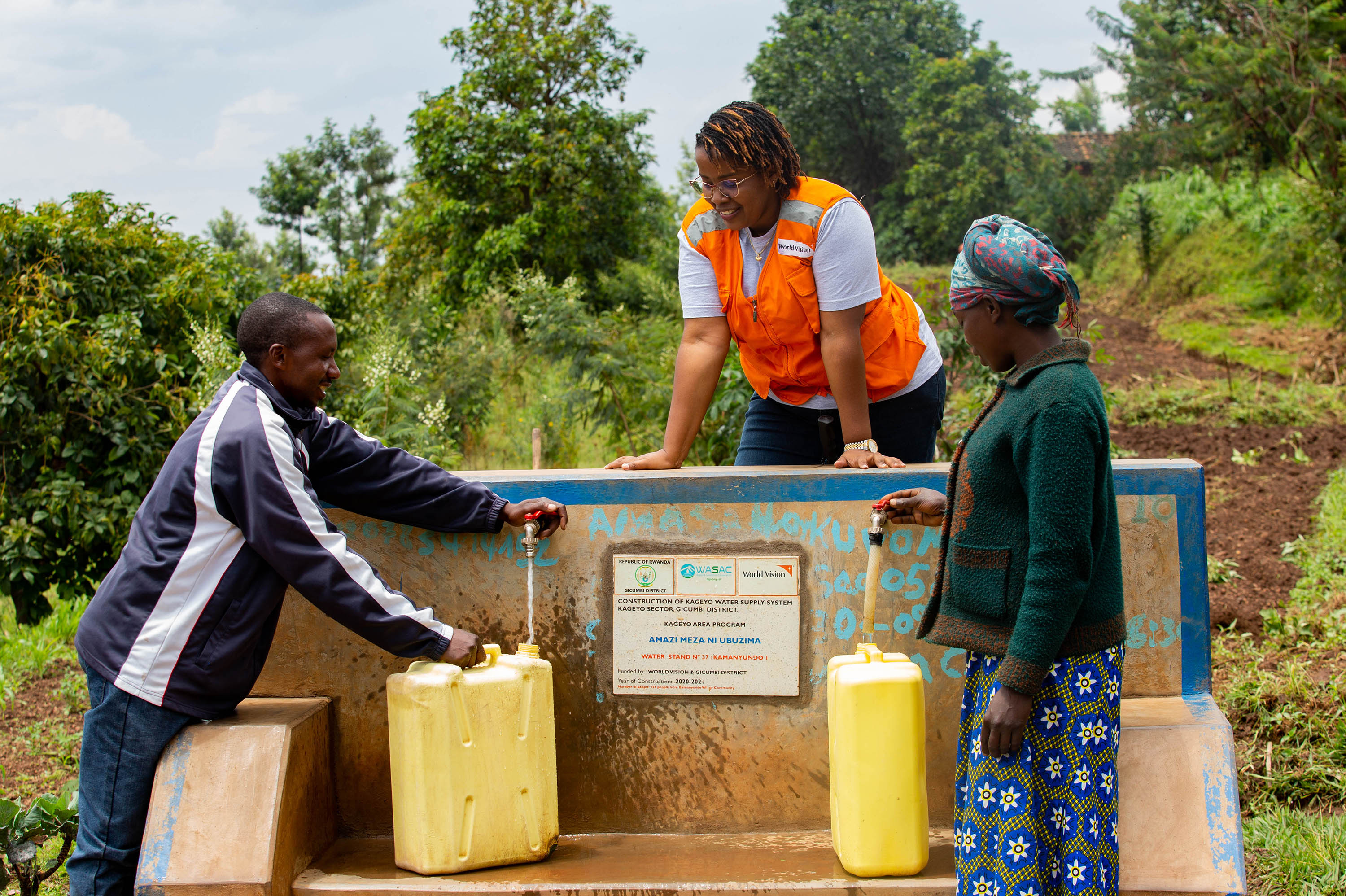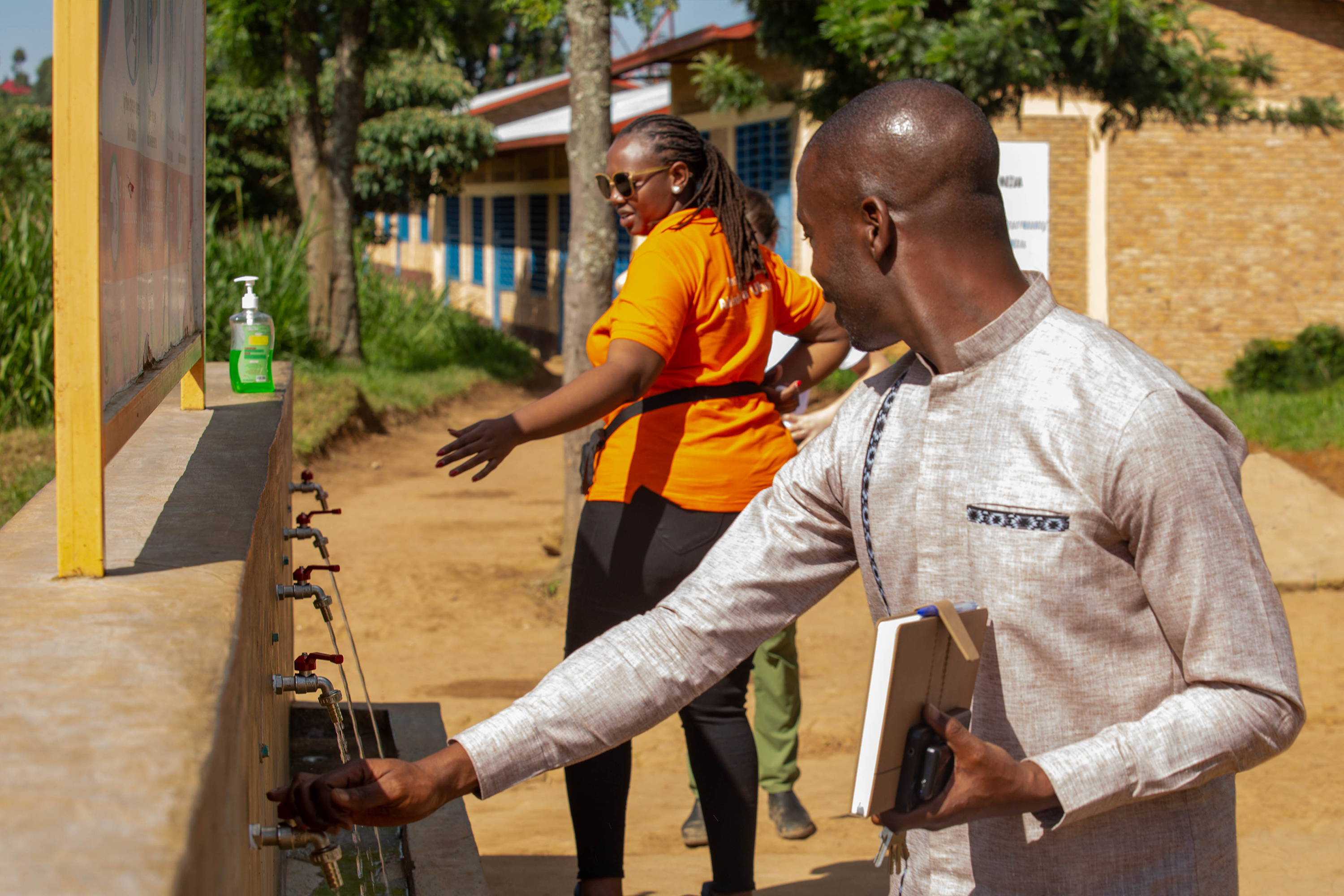For years, whenever Regina Mukasimpunga sat in church, she found it hard to concentrate on anything other than the chore awaiting her when service let out: fetching water.
The never-ending task dominated the life of the rural Rwandan community, forcing residents to leave the house with jerry cans before the sun came up to take long walks in the darkness in the hilly terrain to reach a spring. There, they often competed with other families to fill jugs, everyone desperate to move on with their days as quickly as possible.
“We would wake up at 5 a.m. to get water, which often took two hours. When we finished, we were exhausted,” said Mukasimpunga, at her home in Gicumbi district, about 60 kilometers (37 miles) south of the capital, Kigali. “We couldn’t farm productively.”
Mukasimpunga and her husband, Fulgence Ndemeye, enlisted their three children to help, but the job could last so long it made the children late for school, their tardiness earning them reprimands from their teachers and challenging their ability to keep up in school and study when at home.
Then, in 2021, World Vision opened a water station about 50 meters (164 feet) from their home. The life change was immediate: Now, everyone could start their day on time, take more showers, and wash their clothes more frequently. Mukasimpunga and Ndemeye could grow tomatoes year-round and not just during the rainy season. They could triple the livestock water ration, which meant their cow gave them more milk, which they could sell to their neighbors. The family’s economics improved so much, they were able to join a savings group.
Mukasimpunga and Ndemeye’s story is just one of many. The same story has happened over and over again in Rwanda, changing the daily lives of 1 million people in this country of 13.4 million, thanks to one of the final commitments made by former World Vision CEO Richard Stearns.
Stearns met with Rwandan prime minister Édouard Ngirente in 2018 and launched a five-year plan to make Rwanda the first developing nation with universal access to clean water, starting from the 39 subdistricts or sectors where World Vision was operating at the time. Since then, World Vision has partnered with the government and achieved universal basic water service coverage in the targeted areas.
In 2023, current CEO Edgar Sandoval celebrated when the program reached a major milestone: 1 million Rwandans now have clean water within 500 meters (0.3 miles) of their homes.
“Access to essentials like clean water levels the playing field, empowering kids for achievements like finishing their education and discovering their God-given gifts,” he wrote. “As we do this work together in Jesus’ name, we demonstrate the truest meaning of victory … that Christ came to usher in a new kingdom where hope wins.”
A 30-year partnership
World Vision’s now 30-year history in Rwanda—the ministry has been serving in the country since the genocide ended in 1994—has played a critical role in allowing them to build physical and social infrastructure at scale. World Vision Rwanda is the largest NGO in the country, with an average annual budget of $34 million, and only six of their 303 staff are of non-Rwandese nationality. They are also the country’s largest non-governmental partner in providing clean water.
After the universal basic water coverage initiative kicked off in 2018, World Vision met leaders of the districts where its 39 areas are based to set goals. They signed memos of understanding stating that World Vision would contribute 60 percent of the project’s costs and that the government would contribute the remaining 40 percent.
“If you just look at the journey from 1994 to now, infrastructure development, compared to other countries, has gone very fast,” said Pauline Okumu, the national director of World Vision Rwanda. “The message is: We have to build our country. There’s intentionality around goal setting.”
For engineers, their first step of creating clean water infrastructure is studying the topography of a region and determining if they need to build a pumping station or if they can supply water by gravity, says Murebwayire Marie Léonce, a technical program manager for World Vision’s WASH (Water Sanitation and Hygiene) program. Engineers must design the correct water pumps and install them, and a technical team services the water treatment system.
“Most of the areas where we serve are not reached by road. Service providers transport all materials by car till the nearest road, and the community supports by transporting materials manually from the road to the designated site,” said Léonce.
Not everything has been smooth. Existing infrastructure has been vulnerable to floods and landslides. Land needed for new infrastructure sometimes runs through people’s private property. Negotiating with farmers takes time and occasionally requires the government to step in.
But Okumu, who has worked in a number of countries around the continent, noted that in contrast to public officials she has observed in other places, the Rwandan government has frequently reached out to engage World Vision. Public officials are regularly evaluated on whether they accomplish their goals, and in turn, this accountability spurs them to reach out to their NGO partners to ensure they are doing their part.
Unlike other organizations based in Kigali who might make trips to other parts of the country, “World Vision is community-based,” said Alice Muhimpundu, WASH’s health behavioral change manager. “We are there.”
Further, World Vision’s own vision casting makes them an ideal partner, said Parfaite Uwera, the acting mayor of Gicumbi District, an area of nearly half a million, where CT visited a water pump, a water point station, and a clinic, church, and school.
 Photography by Jeez / Courtesy of World Vision
Photography by Jeez / Courtesy of World VisionWorld Vision’s own long-term planning aligns closely with the government’s own initiatives, making it easy for public officials to work “hand in hand” with them, she said. “World Vision really is special in the area of partnership. … They make sure that what they leave behind is safe and sustainable.”
Nowhere is this seen more clearly than in the government’s decision to allow World Vision to use its own procurement process to acquire the sanitation infrastructure materials, circumventing what would have been a far longer and more tedious process. They also allowed them to hire their own contractors and take care of tendering and operations.
“As a Christian organization, the government believed they would not have to worry about fraud,” said Muhimpundu. “That was simply amazing.”
The Rwandan government also gave World Vision special permission to advance with its project during the pandemic. Rwanda was the first country in sub-Saharan Africa to issue a lockdown and had more stringent COVID-19 regulations than many neighboring nations, yet numerous water infrastructure projects carried on or began construction in 2020.
As these projects have wrapped up, World Vision has handed over control of the water to the government and local councils, which monitor water usage, report any damages or broken infrastructure, and maintain the sites.
Providing sanitation education
World Vision also works with churches from numerous denominations to teach sanitation curriculum, identifying priests and pastors as “key change agents” who can help students make connections between hygiene and Scripture. The most effective teacher, though, has been COVID-19. Anxiety about contracting the disease changed personal behavior and policy.
When churches closed during the lockdown, the government worked with religious leaders to determine its criteria for reopening houses of worship. One feature now necessary for churches: handwashing stations. When people met for the first time after lockdown at one ADEPR (Association of French Pentecostals in Rwanda) congregation in Gicumbi, greeters met them on the steps and directed them to handwashing stations, delivered to them by World Vision.
“Then they could hug and sit next to each other and not feel nervous,” said Sunday Emmanuel, one of the pastors. “Washing is now part of the culture.”
The church has a large outdoor baptismal font; previously, they used rainwater, but now they can take from their clean water supply.
Not all churches have had access to these types of hygienic facilities. For months, the ADEPR church has been hosting another congregation that has been unable to get its own building because of the sanitation requirements. Its leaders have submitted a proposal to World Vision to help them with the sanitation costs for their building.
Accessible clean water has also transformed numerous local institutions.
 Photography by Jeez / Courtesy of World Vision
Photography by Jeez / Courtesy of World VisionAt Groupe Scolaire Muhondo, a school that serves just over 2,000 students, more than half a dozen trophies sit behind the desk of principal Elie Habumuremyi. They finished second in the country last year in primary school girls handball. World Vision’s changes have made it easier for the school to organize sports teams by offering athletes clean drinking water, and the presence of extracurriculars helps incentivize students to stay in school longer. Meanwhile, girls miss school less because there’s more sanitation resources available to them when they’re on their periods.
Leaders at one local clinic that serves a community of 20,000 noted that prior to World Vision’s water installation, more than half of those who came in suffered from some hygiene-related issue. About 20 babies are delivered there a month, and many mothers were forced to return within weeks of giving birth because of a sanitation-related issue. Without access to running water, health care providers didn’t regularly wash their hands or bed sheets.
Some of these issues were mitigated when one of the staffers, Emmanuel Twagirumukiza, invented a water filtration system operated by foot pump. But the scale of World Vision’s new water system has dramatically reduced disease for kids under five, helped patients not contract other infectious diseases while getting help for unrelated issues at the clinic, and lowered the number of intestinal worm cases.
The ministry is not stopping at 1 million Rwandans with clean water, though. They’ve added wells to serve another 200,000 people and expanded into 30 more areas. They may also look at adding more wells to reduce the average distance to clean water from 500 to 200 meters (0.3 to 0.1 miles). (Donors can now support this cause through the organization’s new Believers for World Change subscription giving model.)
“Reaching this milestone has actually strengthened my personal faith as an individual, as a person,” said Innocent Mutabaruka, integrated programs director at World Vision Rwanda.“You can actually see things changing instantaneously. You see the impact that this has on people’s lives and you say, ‘This is God.’”











